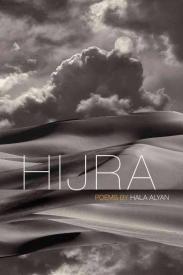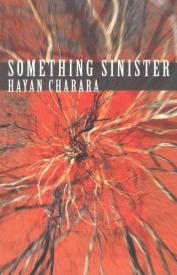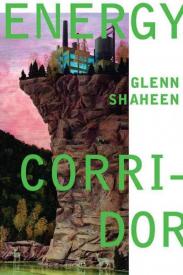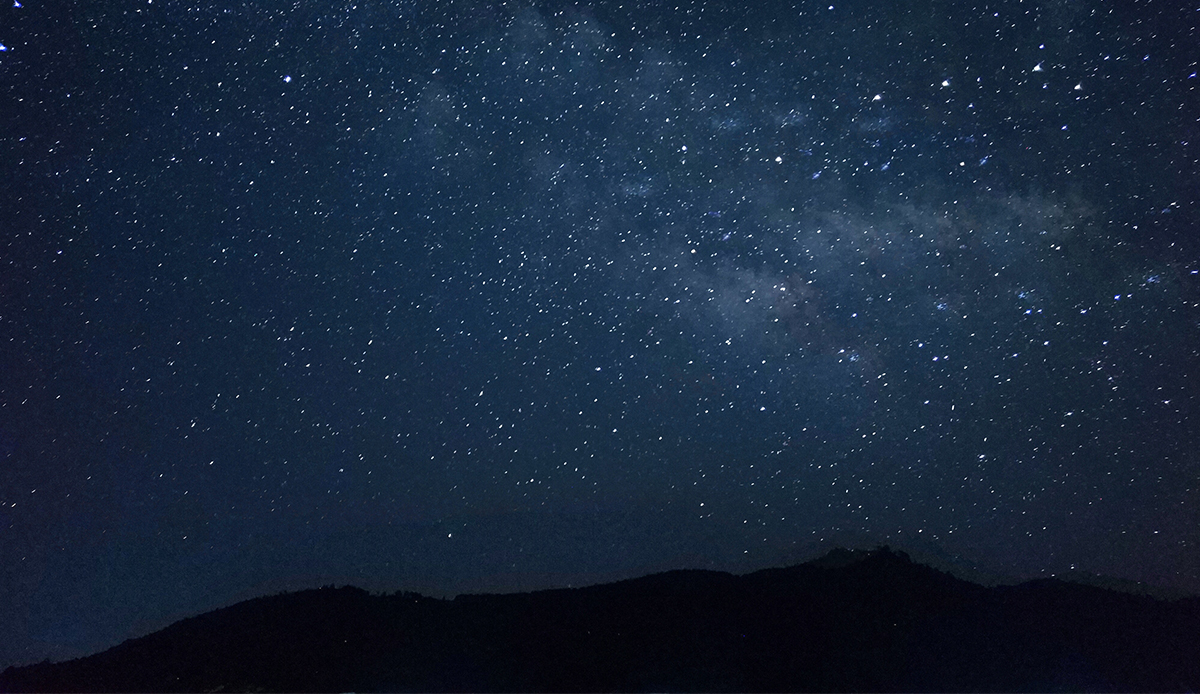


Hijra, by Hala Alyan, Southern Illinois University Press, 2016, 88p, paperback $15.95
Something Sinister, by Hayan Charara, Carnegie Mellon University Press, 2016, 72p, paperback $15.95
Energy Corridor, by Glenn Shaheen, University of Pittsburgh Press, 2016, 88p, paperback $15.95
In our Spring 2017 issue, the North American Review features poems by three Arab American writers, selected and guest edited by Lana Barkawi and Moheb Soliman from Mizna: Prose, Poetry, and Art Exploring Arab America. The work Lana, Moheb, and everyone else at Mizna do is truly inspiring. In addition to publishing a beautiful magazine of compelling literature and art, they organize the annual Twin Cities Arab Film Festival, ongoing since 2003—an impressive feat of longevity and dedication to the arts that we should all admire and support. While the unifying theme of this suite of NAR poems echoes Mizna’s own mission to provide a forum to promote Arab American culture, the work of these three poets—Hala Alyan, Glenn Shaheen, and Hayan Charara—could hardly differ more in their styles and in their attentions to a troubled (and troubling) world roiling around them, and their latest books of poetry bear these differences out.
Hala Alyan’s Hijra takes its readers on a loose lyrical journey of women suffering and trying to survive the brutality of war, migration, and transnational marginalization. I say “loose lyrical” because one is hard pressed to tease out a specific narrative thread, but then, that’s the point. Rather than a singular experience, Alyan immerses us in a global experience that nevertheless attends to the minute particulars of these women. Personae may shift from poem to poem, but the poet’s preoccupations remain consistent. Hijra is, for instance, a very bodily book, by which I mean that the poet never drifts far from the imperatives of our bodily selves. These are poems of teeth, jaws, ligaments, legs, breasts, fists, mouths, lungs, feet, hands. Women’s bodies endure threats of sexual violence (“the moons men broke into our bodies for”), but they are also the setting for transformation (“We begged our bodies for / alchemy, death into new lungs”).
This preoccupation with bodily needs is perhaps most consistently demonstrated in the persistent presence of hunger, sometimes metaphorical—“the red desire of our bodies”—but more often literal—“We eat the gazelle tongue first. / Her language engulfs us: grass pastures, sky, mushroom clusters / budding in the field of poinsettias.” The familiar metonymy of the tongue here echoes this collection’s interest in language (and therefore, perhaps, poetry) as the means by which we might be saved. Similarly, both writing and naming are acts of salvation throughout Hijra. In the title poem, the poet describes such a scene of survival: “Allah’s calligraphy stitched / our vertebrae. We wrote their unsaid names / on parchment, buried them in boxes, gave birth / to our daughters in caves.” In a later poem, women “etch the names of dead men / onto our necks with the smoldering tip / of sparrow feathers,” and in another, the poet is also concerned with posterity and memory: “I name my daughters after the fled villages, / Akka, Quira. They speak the language of falcons, / lyrics about animal hearts, succulent, / red.”
The women of Hijra “practice a new alphabet,” one that is shot through with animals, specifically birds, not only the sparrow and falcons above, but also wrens, starlings, owls, gold finches, black finches, geese, crows, hummingbirds, hawks, pelicans, larks. But the book resists the too-familiar poetic symbology that equates women with birds. Rather, these are actual creatures, more suggestive of writing than of beautiful pets: “Outside, a cloudless night, / a sky so listless it scripts egrets / into a swoop of gray.” In this poem, “Script,” the birds are authors or artists, not objets d’art.
In one notable poem, “Fatima,” Alyan sketches a portrait of a woman living in diaspora in the Midwest of “Amrika,” represented in her mind by “the pink meat we fry in oil to crisps.” She experiences the anxiety of losing one’s essential identity in a foreign place where even the “birds have a different aubade,” a depressing place of “strip malls and bankrupt towns,” where her “daughters grow fleshy and cunning.” Fatima suffers a kind of dissolution of her sense of self: “The cold twists my bones into a nest, / and the window becomes a creek of fingers.” No longer bird, she no longer feels like the agent of her own actions, no longer the author of her life. Hijra is a desperately necessary book of poems, not because we see the “airport custody room” and those seeking asylum in the U.S.—though, yes, we need to witness these scenes made into art, too—but because we experience the sometimes tragic, vivid details of women—mothers, daughters, sisters—as they endure.
The poems in Glenn Shaheen’s Energy Corridor at times come across as the rapid generation of ideas and observations by an acutely smart person, which is not to say they lack artfulness. Rather, they wash over the reader paratactically, presenting moment by moment perception, tumbling forth as they occur to the poet’s consciousness—or I should say the poet’s self-consciousness because the “I” of this book seems always to be concerned not only with the self but with the very reality and reliability of the self, almost to the point of psychosis. Take, for instance, the opening of the brilliant (pun tolerated) early poem, “Beautiful Night”:
Who wants to make somebody cry, to see a face lose
its structure and collapse, in night under clouds lit
yellow by streetlamps and buildings, or in day under
the relentless gaze of fluorescent lights?
The poem navigates both the inner and outer worlds: the emotional experience of guilt and possible regret over causing someone else’s pain crossed with the outer observations of light in a hypothetical night or day. The poet then sinks into anxiety, panic even, as he tries to orient himself in time and space:
Yesterday
was Tuesday, and today is Wednesday. Underneath
our feet there are new fuses that web in every direction,
from church hall to soup kitchen.
The attention to the day of the week is a reminder of reality, just as the understanding dawns on the poet that under the surfaces of our uber-technical world, energy and electricity (“new fuses”) course, connecting us all. It’s not a pleasant realization of ecological interconnectedness. In fact, the poem takes a dark political turn:
Consider the power
of the Constitution, the lyric, the tilted script. Unity
among the disparate masses. We could have been
a nation of poets, but instead we’re a nation of clerks.
The reader follows this associative line of the poet’s thinking in a manner that echoes cognition itself. The leaps from one thought to the next are explicable but not obvious. From the initial scenario of walking at night in the city, the poet allows his mind to go free, from a meditation on literal power and energy to political and literary power, to the depressing admission of the overwhelming power of American consumer culture. (“Beautiful Night” originally appeared in the online journal Birdfeast, which is worth exploring if only to read the rest of this remarkable poem.)
I don’t usually like to spend so much time on a single poem when writing reviews of books, but many (maybe most) of Shaheen’s poems seem to be begging for this kind of close reading, which I’d say is the sign of a damn good book. Energy Corridor invites readers to linger and savor while also putting them on edge, specifically as it draws attention to the constructed nature of social reality. In a poem called “Dandelions” the poet informs us:
In the old West to play
up the reputation of murder
and brawn towns would
stage elaborate yet fake
gun battles at train stations,
pig blood splashed along
the platform, the idea
of death was big business.
The mythology of the old West was (and is) so vigorous that it fictionalized itself, creating new narratives for us to believe in—and cash in on. The implication is that we’re still telling these kinds of stories, as the next lines suggest: “My brother doesn’t sleep / well, he’s not happy to be / home from Iraq.” The specific wars in Iraq and Afghanistan—not to mention the all-pervasive “War on Terror”—are exactly these kind of realities: “big business.”
Other moments throughout Shaheen’s work dwell on what is and is not real. The poet himself admits, “As a child I tried to master the principles // of illusion.” We experience one of these illusions when “it / sounds as though the child is crying, / but she is just making her dolls cry, manufacturing sorrow // for her own sense of fun and realism.” This book offers its “own sense of fun and realism,” too, but underlying all of this play is a claustrophobic anxiety of being immersed in the pretend world: “I want to get / out of this electric mess,” the poet confesses. “Broadcasts don’t / even sign off anymore, the national / anthem resolving to static.” There is no static (no stasis, no stability), and nothing can ever be resolved. We live in the constant condition of mediated communication. There is hope, perhaps, in the act of writing a poem as it requires of us enough mindfulness to observe “Voices humming just beneath / the surface of every object, truths / opening themselves like legs on the edge / of a bed,” an apt definition of the poetic experience.
If Hala Alyan’s poems cohere as a loose lyrical journey, and Glenn Shaheen’s carry us along through self-conscious perception and cognition, Hayan Charara’s functions very much in a familiar confessional mode, at times narrative, often finely wrought formally, but always authoritative—one might even say masterful. All art (I say, pounding my fist on the table) must prove itself to its audience: the first notes of a musical composition, the opening lines of a novel, the initial tentative steps of a dance. Each moment, each gesture is an argument to continue, turn the page, keep listening. These points of authority convince us that the artist knows what they’re doing, that we’re in good hands.
The opening poem of Charara’s Something Sinister, “Being Muslim,” is just such a point of authority. The poet introduces his parents by addressing them with the conventional lyrical O:
O father bringing home crates
of apples, bushels of corn,
and skinned rabbits on ice.
O mother boiling lentils in a pot
while he watched fight after fight,
boxers pinned on the ropes.
A traditional domestic arrangement (man providing, woman cooking, man watching sports) is accompanied by the specter of violence (“fight after fight”) that returns over and over throughout Something Sinister. We learn that the father admired Muhammad Ali, “worshipped him and with / a clenched fist pretended to be: // Float like a butterfly, sting like a bee.” This playful impersonation turns dark as he “knocked down / my mother again and again.” The poet dwells on the irony of his father’s simultaneous piety and violence: “he prayed, he prayed, five times a day,” concluding with an allusion to some of Ali’s famous trash talk (“I’m so mean I make medicine sick”) with the final line: “and he was mean.” Ali’s bravado hovers over this poem as a kind of poetry itself, a song of himself, as the masculine braggadocio of the boxing ring gets reenacted in the domestic space.
But I want to dwell for a moment longer here on the O that begins the poem—and begins the book—because it would be easy to read right through it as a simple poetic device announcing the lyrical. Here, though, it serves multiple functions. It marks the grammar of the vocative mood, as the poet directly addresses O father (“O you loved being Muslim then”). It also marks what one might call the emotive mood, as the poet remembers “O mother.” This O is not grammatically necessary but is poetically vital. Later the poet includes in this emotive O (“O prayer. O god of sun. // God of moon”), expanding the radius of his own prayerful feeling—his longing to understand his father and to find the right words for the suffering at the heart of his parents’ relationship.
Charara returns to the O more than do most poets today, who perhaps reject it as archaic, relegated along with alas and lo, ere and o’er as too old fashioned for contemporary ears. Charara, however, titles one profoundly mournful poem “O!” and yet another, “O Mother, O Father,” which recalls a vivid memory as a child riding with his parents in “the ’76 Buick Riviera, the young husband / and wife in it.” The poet reaches for a way to figure this memory and make meaning from it: “The low but audible AM radio is like the engine / which is like the tires against asphalt which is like / the boy in the backseat humming.” How do we shape the past? What metaphor will suffice? The poem continues in this manner: this was like this was like this. The child hears a news story on the radio about a missing girl and observes “the hushed speech” of his parents in the front seat until the poet settles into the grief of O:
O my mother. O my father, what of this world,
which forgives the misdeeds of its children. O world,
you never stopped for anyone. O Eva Gerline Debruhl,
from Rock Hill, South Carolina, you are still missing.
The letter O is complete unto itself, perfected, suggestive of the opening of the mouth, the source of speech, the source of poetry in the first place. O is infinite, a drone that could go on forever. Oooooo. O? O. O! O is also a kind of death—zero, naught, nothing, zip, zilch, nada. From the experience of nothing—the specter of death that is the fact of our mortality and the grief we live with as we lose people we love—we can become sympathetic. The O, then, is really about the other, other people. When we exclaim O in a poem, we are either addressing someone or something, or we are externalizing an abstraction or some inner state as a way to know and deal with it. The O is the first, most ancient objective correlative. Charara’s poems are about missing in this way, about the silence between us, about death, and finally about naming what has been lost to us. Something Sinister is one of those books I can’t stop telling people to read (read this book!) because it dwells so deeply in the real human experience of the lyrical O.


